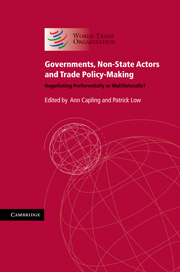Book contents
- Frontmatter
- Contents
- List of figures and tables
- List of contributors
- Acknowledgements
- Disclaimer
- Introduction
- 1 The domestic politics of trade policy-making: state and non-state actor interactions and forum choice
- 2 Chile
- 3 Colombia
- 4 Mexico
- 5 Indonesia
- 6 Thailand
- 7 Jordan
- 8 Kenya
- 9 South Africa
- 10 The influence of international non-state actors in multilateral and preferential trade agreements: a question of forum shopping?
- 11 Main findings and conclusions
- Index
- References
6 - Thailand
Published online by Cambridge University Press: 05 July 2014
- Frontmatter
- Contents
- List of figures and tables
- List of contributors
- Acknowledgements
- Disclaimer
- Introduction
- 1 The domestic politics of trade policy-making: state and non-state actor interactions and forum choice
- 2 Chile
- 3 Colombia
- 4 Mexico
- 5 Indonesia
- 6 Thailand
- 7 Jordan
- 8 Kenya
- 9 South Africa
- 10 The influence of international non-state actors in multilateral and preferential trade agreements: a question of forum shopping?
- 11 Main findings and conclusions
- Index
- References
Summary
Introduction
The politicization of trade policy-making in Thailand is arguably more pronounced than elsewhere in the world, including at the global level where multilateral trade negotiations (MTNs) under the World Trade Organization (WTO) are currently stalled. Indeed, the Thai case of trade policy quagmire is quite dramatic for having adversely impinged on the country’s body politic to the extent that a popularly elected government was ousted in a military coup, and an anti-free trade agreement (FTA) bias worked its way into a new military-organized constitution, contributing to a prolonged and protracted political crisis. That Thai trade policy has become increasingly politicized over the first decade of the twenty-first century is attributable to a number of dynamics, some in parallel to trade policy experiences in the rest of the world, others more specific to domestic circumstances.
The end of the Cold War and the concomitant wave of democratization in the developing world opened up the arena of trade policy, which had previously been insulated and considered the exclusive domain of technocratic expertise and bureaucratic wherewithal at the policy level. Inclusiveness and demands for public participation made logical headway as post-1988 politics in Thailand entered a period of inexorable political liberalization. After a military coup in February 1991 threatened to produce a disguised military dictatorship through elections and parliamentary rule, a ‘people’s power’ movement took hold and expelled the military from government in a Bangkok-based, middle class-led popular uprising in May 1992. The post-May 1992 political reform movement witnessed an unprecedented expansion of civil society organizations (CSOs), culminating in the reform-driven 1997 constitution.
- Type
- Chapter
- Information
- Governments, Non-State Actors and Trade Policy-MakingNegotiating Preferentially or Multilaterally?, pp. 161 - 185Publisher: Cambridge University PressPrint publication year: 2010
References
- 1
- Cited by



